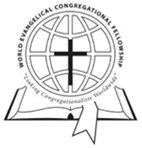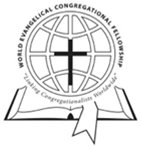Our History
Welcome
A Few Words About Our History
The history of the World Evangelical Congregational Fellowship goes back to the 35th Annual Meeting of the Conservative Congregational Christian Conference (USA) which convened on 2-4 August, 1983, on the campus of Bethel College in St. Paul, Minnesota. The Annual Meeting took on an international flavour. Visitors included Rev. Len Kingston, General Secretary of the Fellowship of Congregational Churches, Australia, Rev. David Saunders, a pastor from the Evangelical Fellowship of Congregational Churches, United Kingdom (who was attending his second Annual Meeting) and Rev. Sasiuo Haruo, President of the United Churches of Christ in Moen, Chuuk, along with three other Micronesian pastors. In a meeting between Rev. Len Kingston, Rev. David Saunders and the Executive and Fraternal Relations Committee of the CCCC, it was agreed that the ties between evangelical Congregationalists from around the world needed to be strengthened and that there needed to be a means by which effective communication and joint ministries could be undertaken.
The formation of an international evangelical Congregational union was proposed and the participants agreed to meet together a year later for further discussions. A year later, at the 36th Annual Meeting of the CCCC, 24-26 July, 1984, on the campus of Gordon College, Wenham, Massachusetts, a second meeting was held. Present were Rev. Len Kingston, Rev. Edward S. Guest, Secretary of the Evangelical Fellowship of Congregational Churches, UK, Rev. Francisco de Souza, a missionary with dual standing in the CCCC and the Union of Evangelical Congregational Churches of Brazil, and the Executive and Fraternal Relations Committee of the CCCC. The four Micronesian pastors also returned, but they did not participate in the discussions. At this meeting it was decided to form an international fellowship to be called the World Evangelical Congregational Fellowship, and the first three articles of its Constitution were written. During the next year, the Constitution of the WECF was completed by correspondence. The initial draft was written in the United States then sent to England and Australia for further input. This resulted in a second draft which was voted on and approved by the three participating bodies: the Conservative Congregational Christian Conference in the United States, the Fellowship of Congregational Churches, Australia, and the Evangelical Fellowship of Congregational Churches, UK. The sharing of newsletters, visits and a six-month pastoral exchange between the CCCC and the FCC further strengthened the ties between these bodies.
It was further decided through correspondence, that the inaugural assembly of the WECF would be held in England on 15-18 October, 1986. The stated purpose of the meeting was “to constitute the WECF, elect officers, determine the country for the next meeting and enjoy rich fellowship in Christ around His Word.” Throughout the process of forming the WECF, there was a wonderful sense of God’s providence. When the idea of such a fellowship surfaced in 1983, it seemed to come to several hearts at once. In 1966, there had been an attempt to form an International Evangelical Congregational Union. A Constitution had even been drawn up, which later served as a reference for the drawing up of the WECF Constitution, but the timing was not right. At that stage, the EFCC and the FCC, as well as several other founding members of the WECF, did not exist. Twenty years later, the timing was right and the WECF was born. The feeling of those present at the inaugural assembly in England was that this was a “gathering” rather than a planned event – God had “gathered” us together into a new fellowship of evangelical Congregationalists from around the world.
Participants in the inaugural assembly meetings were: the Fellowship of Congregational Churches, Australia, the Union of Evangelical Congregational Churches of Brazil, the Evangelical Fellowship of Congregational Churches, UK, the Congregational Union of Ireland, the Union of Congregational Churches of Portugal, and the Conservative Congregational Christian Conference, USA. All of these had previously voted to become part of the WECF. Three other groups had also voted to join but were not represented. They were the United Churches of Christ of Moen, Chuuk, the Congregational Union of New Zealand and the Evangelical Fellowship of Congregational Churches of South Africa.
The meetings began at Pilgrim Hall, near Uckfield, in Sussex. The Constitution was reviewed and minor adjustments made. Attention was given to six areas of ministry that are outlined in Article 10 of the Constitution as possible areas for cooperation – missions, evangelism and church growth, publications, personnel exchange, theology and society. These areas were included in the Constitution because it was felt that in them there could be realistic cooperation and an exchange of information that would be to the benefit of the member associations. The final meeting saw the election of the WECF’s first officers – President: Rev. Clifford Christensen (USA); Vice-President: Rev. Vanderli Carreiro (Brazil); Secretary: Rev. Len Kingston (Australia); Treasurer: Rev. Edward S. Guest (England); Members-at-large: Rev. Daniel Calado (Portugal), Rev. Malcolm Coles (Ireland) and Dr. Graeme Smith (USA).
Worship was an important part of each day and a wonderful spirit of unity was demonstrated in all sessions. Brothers and sisters in Christ from around the world prayed and sang together in their own language as they worshipped the Lord. The inaugural session of the Assembly was held on Saturday 18 October, at Westminster Chapel in London. Attention centred on the four words in the name of the new organization, as representatives from each member country focused on the word “World,” Rev. Len Kingston spoke on what it means to be “Evangelical,” Rev. Edward Guest spoke on what it means to be “Congregational” and Rev. Clifford Christensen spoke on what it means to experience “Fellowship.” A covenant, patterned after an old church covenant of 1818, was then signed by representatives from each association. The day of worship concluded with a Communion Service. The WECF had been duly constituted and had officially commenced its journey.
Since the inaugural meetings, Triennial Meetings have been held in Mendes (Rio de Janeiro), Brazil (1989), Sydney (NSW), Australia (1992), Braintree (Massachusetts), USA (1995), Cape Town, South Africa (1998), Olds (Alberta), Canada (2001), Auckland, New Zealand (2004) and ‘Hothorpe Hall’ (Leicestershire), England (2007), Rio de Janeiro, Brazil (2010), Wollongong (NSW), Australia (2013), Orlando (Florida), USA (2016), Dinas Powys (Wales), UK (2019) and Velingrad, Bulgaria (2023). Additionally, Mid-Term Meetings have been held in Velingrad, Bulgaria (2008), Lisbon, Portugal (2011), Cape Town, South Africa (2015) and Urdinarrain (Entre Rios), Argentina (2017).
These have been times of rich fellowship, blessing, encouragement and challenge. A commitment to the areas that unite has overcome any areas of difference that have arisen from time to time and there has been significant cooperation between member associations of the WECF. Special projects have been identified and supported, including several fund-raising appeals to enable ministries to commence or continue. Several new member associations have been welcomed into the WECF and we aim to have a majority of fellowships represented at the Triennial Meetings.
Those who have been involved in this worldwide fellowship have found it to be a rich and blessed experience. Evangelical Congregationalism is alive and well in many parts of the world. To God be the glory!
(Adapted from an article by Rev. Clifford Christensen)

